Which teas should you use for making homemade kombucha? And which teas should you avoid? Breaking down the best tea for kombucha here!

Homemade kombucha basically has just four ingredients: tea, water, sugar, and starter kombucha. This means it’s vital that you use good quality, proper ingredients when starting your fermentation.
So in addition to making sure that the tap water in your area is good for kombucha and that you’re using the right sugar, make sure you’re using a tea that your kombucha and SCOBY will thrive on!
What is tea?
With tea easily being the most popular drink in the world, there are thousands of varieties of tea and they all seem to boil down to a common trait – plants soaked in hot water.
When people are talking about tea, however, they’re usually talking about the tea plant known as camellia sinensis. This is the plant that gives us black, green, white, and oolong tea.
This popular tea also happens to be the tea that your kombucha SCOBY loves! While sugar provides energy for the yeast to eat, the tea provides minerals that the bacteria and yeast need (more on how a SCOBY works here). Ensuring you use the correct tea for your kombucha will create a healthy SCOBY that will continue churning out batches for years to come.
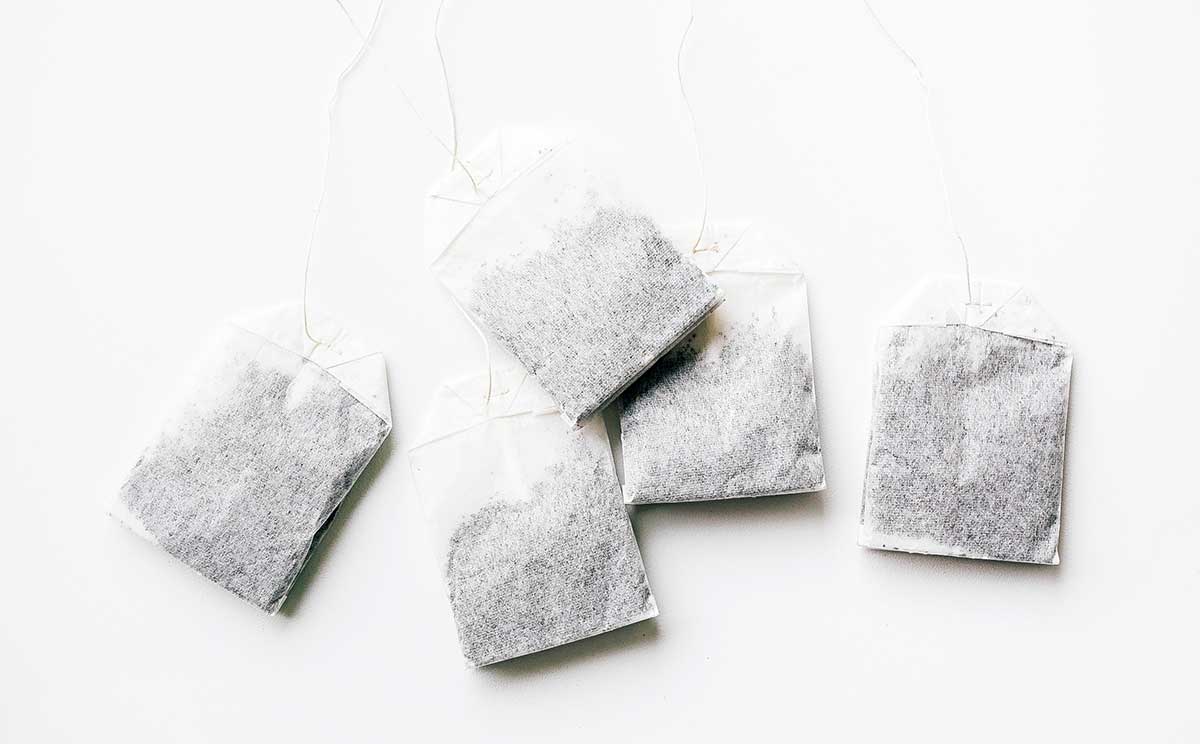
Best tea for making kombucha
Black Tea: Tea leaves that have been oxidized for a long time (longer than green or oolong teas), creating a strong flavor. Common types of black tea that work well in kombucha include Ceylon and English Breakfast (avoid Earl Grey, see “tea to avoid” below). When growing a SCOBY, only use black tea. Once your SCOBY has been through 4 or 5 batches, you can begin introducing other teas.
Green Tea: Tea leaves that have been minimally oxidized, creating a mild earthy flavor. Use green tea in combination with another tea or on its own. (Our guide to types of green tea leaves here!)
Oolong Tea: Tea leaves that have been partially oxidized (more than green tea but less than black tea), creating a mild grassy to fruity flavor. Use oolong tea in combination with another tea or on its own.
White Tea: While black, green, and oolong teas are made from mature tea leaves, white tea is made from the young leaves and is minimally oxidized. This creates a delicate flavor and light color. Use white tea in combination with black, green, or oolong tea (at least 25% of mature tea leaves)
Some Herbal Teas: “Herbal tea” is a catch-all term that includes any tea not made from tea plant leaves. Herbal teas can be made from herbs, spices, or plants. While most herbal teas are not suitable for fermentation, there are a few that are suited for kombucha:
- Rooibos Tea: Made from the leaves of a South African shrub, this is a different species of tea, giving an earthy flavor to kombucha. Use rooibus tea in combination with black tea (at least 25% black tea).
- Hibiscus Tea: Made from the dried flowers of the hibiscus plant, this bright pink kombucha has a tart, floral flavor. Use hibiscus tea in combination with another tea or on its own.
- Butterfly Pea Flowers: Made from the dried flowers of the butterfly pea plant, this bright blue/purple kombucha has a floral, slightly earthy flavor. Use butterfly pea flower tea in combination with another tea or on its own.
But don’t let that stop you…
Many of our readers have experimented to with different types of tea with much success! Like Jennifer, who comments: “Hi Sarah. I made a batch of F1 using 2 tbsp Blackcurrant loose leaf tea and 8 black tea bags. I was amazing. I’m just waiting for a second batch to be ready in a day or so!” Comment with your favorite tea for kombucha below!
Cold-brewed tea also works well for brewing kombucha! Here’s how to cold brew tea at home.
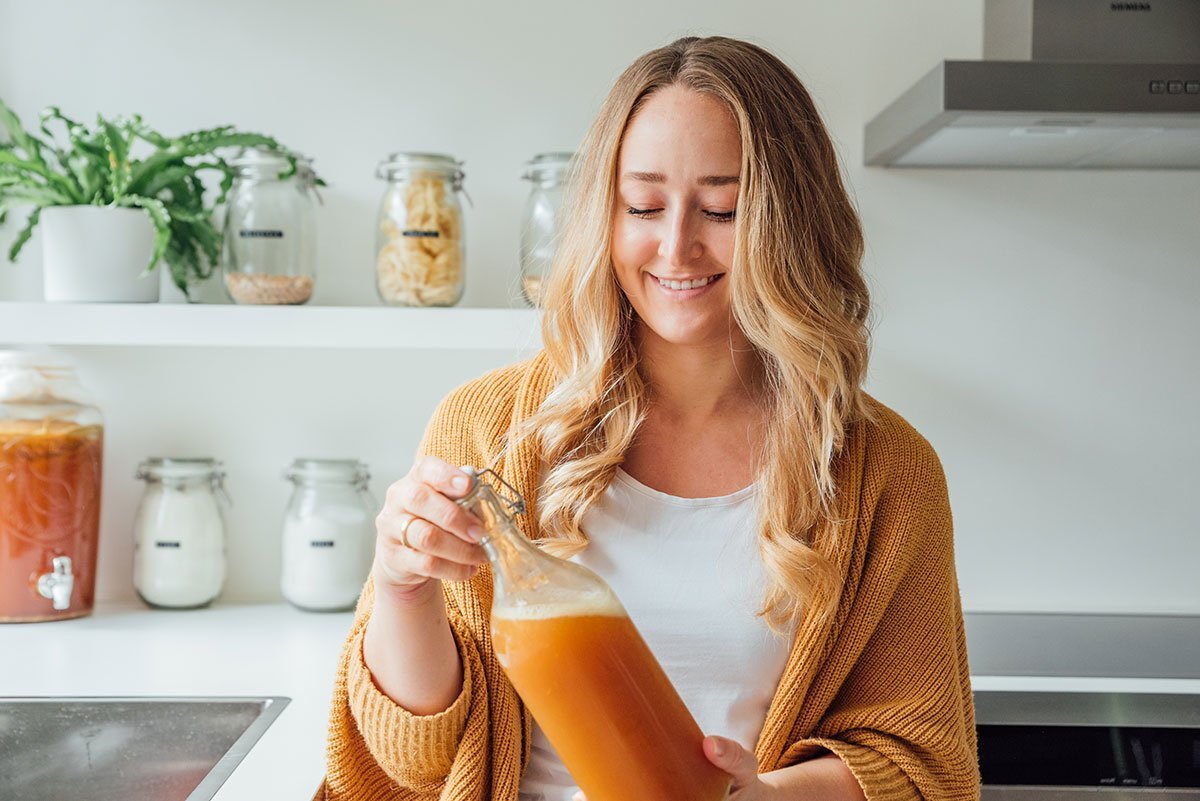
Tea to avoid when making kombucha
Most Herbal Teas: Most herbal teas are not suitable for brewing kombucha, as they don’t have the nutrients needed for your fermentation to thrive (and can actually lead to kombucha mold!)
Tea with added flavor: Many teas contain not only tea leaves, but the addition of spices or oils. Avoid tea that has anything added, as it can react with the kombucha and cause your fermentation to go bad. Examples of tea with added ingredients include:
- Earl Grey: Avoid this black tea variety, which has added bergamot oil.
- Chai: Avoid this black tea variety, which has added spices.
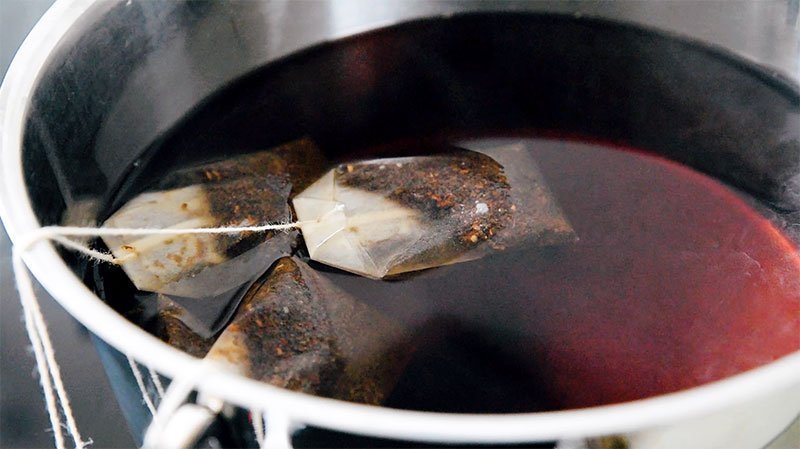
Can you use Loose leaf?
You can use loose leaf tea to make kombucha! For every 4 bags of tea used in the kombucha recipe, substitute 1 Tbsp of loose leaf tea.

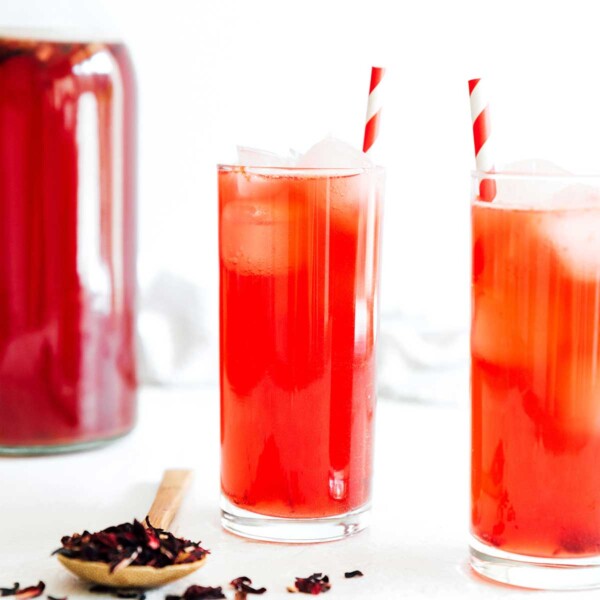
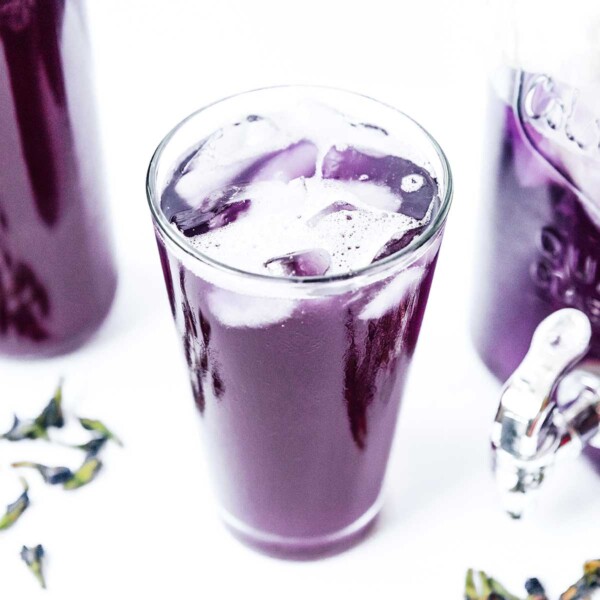

Hi Sarah!
My scoby hasn’t been fermenting the sweet tea/starter tea very well … and I think it’s because I might have used flavoured black tea while back. How likely is it that it can fully recover back to its full Scoby-health?
Thank you!
Hey there! Flavored black tea can definitely throw off your SCOBY—some oils and additives can stress or weaken the culture. But the good news is: if it still smells tangy and there’s no mold, it can bounce back! Brew a few batches with plain black or green tea and full-strength starter, and your SCOBY should rebuild its strength over time. Be patient—it’s like kombucha rehab, but it works!
Good morning Sarah,
how do I use Lemmon Myrtle loose tea in 1st ferment. I would like to brew a batch of 14 cups and would like a recipe of how much do I use and do I combine it with Green Tea or use just the Myrtle.
Thanking you in advance,
Lynne.
Lemon myrtle is such a lovely, fragrant herb—but since it’s not from the Camellia sinensis plant (like green or black tea), it doesn’t have the nutrients your SCOBY needs to thrive on its own. So for your 14-cup (about 3.5-quart) batch, I’d recommend blending it with a true tea. A good ratio would be about 3 to 4 teaspoons of green tea (or 4 tea bags) combined with 1 to 2 teaspoons of dried lemon myrtle. Steep them together in about 4 cups of hot (not boiling) water, then strain, add 1 cup of sugar, stir to dissolve, and top off with cool water to reach 14 cups total. Once the mixture is fully cooled to room temperature, add your SCOBY and starter tea. This way, you’ll get that bright lemony flavor while still giving your culture the nutrients it needs to ferment properly. Let me know how it turns out—sounds like a delicious brew!
Starting round two of my third brew. For F2 I typically use the only 48 ounce Synergy bottle I have, along with the gallon jars used for the first fermentation, of course removing the scoby before adding fruit to F2. I use a Carbo Craft lid for the Synergy bottle, and a fermentation lid w/gasket and airlock for the gallon jars.
I typically use fresh Pineapple, and ginger, to flavor and fizz my F2. For a 48 ounce jar, how much pineapple should I be using to get a nice sweet flavor, and fizz? I macerate the chunks of pineapple turning them into a mush, if you will, but not blended so much that it is liquified. Just just enough to make it easier to put into the Synergy bottle. Should I leave the pineapple and ginger in chunks? And, should I also be putting into the F2 some organic cane sugar (which is what I use for the first ferm)?
My last batch I left the pineapple and ginger in the gallon jar for 4 or 5 days, several days long than my first F2 brew. It seemed to be a vinegary. Perhaps I did not use enough pineapple, and I did not use any sugar at all for F2. If I should be using sugar with the fruit, how much sugar should be used for the gallon jar, or, should I be using gallon jars at all for F2? Would it be best to use 48, or 16 ounce bottles vs. gallon, or does it matter? Sorry for being so long winded!
These are great questions! For a 48-oz bottle, about ½ to 1 cup of macerated pineapple is usually plenty for flavor and fizz. Keep the fruit in small chunks (rather than fully blended), since this makes straining easier and prevents too much pulp from clogging bottles. Ginger can be added in thin slices or grated, depending on how strong you like it.
For fizz, adding a spoonful (1–2 tsp) of sugar or honey per bottle can give the yeast a little more food to work with, but often pineapple itself has enough natural sugar. The vinegar flavor you noticed after 4–5 days was likely just over-fermentation, so I’d try bottling smaller sizes (16–20 oz) instead of gallon jars for F2—this traps carbonation better and gives you more control. For F2, think short and sealed—2–4 days at room temp, then move to the fridge when it’s bubbly and tangy but not sour.
You’re on the right track—it’s mostly about tweaking fruit amounts, sugar, and timing until it matches your taste! Would you like me to give you a step-by-step for your pineapple-ginger combo so you can repeat it consistently?
Hello Sarah, absolutely. A step by step would be fantastic. I really need to branch out to other flavors, but I just can’t get enough of that pineapple-ginger taste😊
I guess it is a good thing I saved all those Kevita bottles. But, how do I know that even with the Carbo caps, they are airtight? If I chose to use the original Kevit cap, for my F2, is there anyway to determine if once the cap is screwed on tightly, that it has formed an airtight seal?
There’s no real way of seeing if it’s sealed 100% without just waiting to see if it gets fizzy! If you tighten the cap though it should!
I’m still having problems with the fizz and I followed the 10 steps , is there any other reason im not getting fizzy kombucha?
Hey Gary—if you’ve followed all the steps and still aren’t getting fizz, a few sneaky things could be the issue:
Too little sugar or juice in F2 — the yeast needs fuel to make bubbles.
Weak or tired yeast — especially if your SCOBY is older.
Loose bottle seals — even tiny leaks can let gas escape.
Too
short or cold F2 — aim for 3–7 days at room temp (70–78°F).
If you haven’t already, try using one plastic bottle in the batch—you can squeeze it to feel when carbonation builds. That trick makes it easier to tell if fizz is forming. You’re close
i’ve made a brew with earl gray with absolutely no problem…. they all seem to ferment just fine within 10 days full colonization. i’ve even made 2 gallon batches with it, no problemzzzzzzz.
Will you please comment on using green matcha tea powder….it’s fine ground and not sure if it will ruin my scobie
Matcha is super finely ground green tea, so while it technically comes from the Camellia sinensis plant (which kombucha loves), it can be a bit tricky for brewing. Because it’s a powder, it doesn’t strain out like loose-leaf tea does, and that fine sediment can cloud your brew and potentially smother or irritate your SCOBY over time.
If you’re set on trying it, I’d recommend doing a small test batch and keeping a separate SCOBY just for matcha experiments. Or better yet—brew a regular batch with green tea, then stir a bit of matcha into your finished kombucha for a fun flavor twist without risking your culture.
I am in Australia and seeking the best black tea for my first fermentation
Hi. I had success using peach oolong tea from Zen’s Tea House. They also ship internationally.